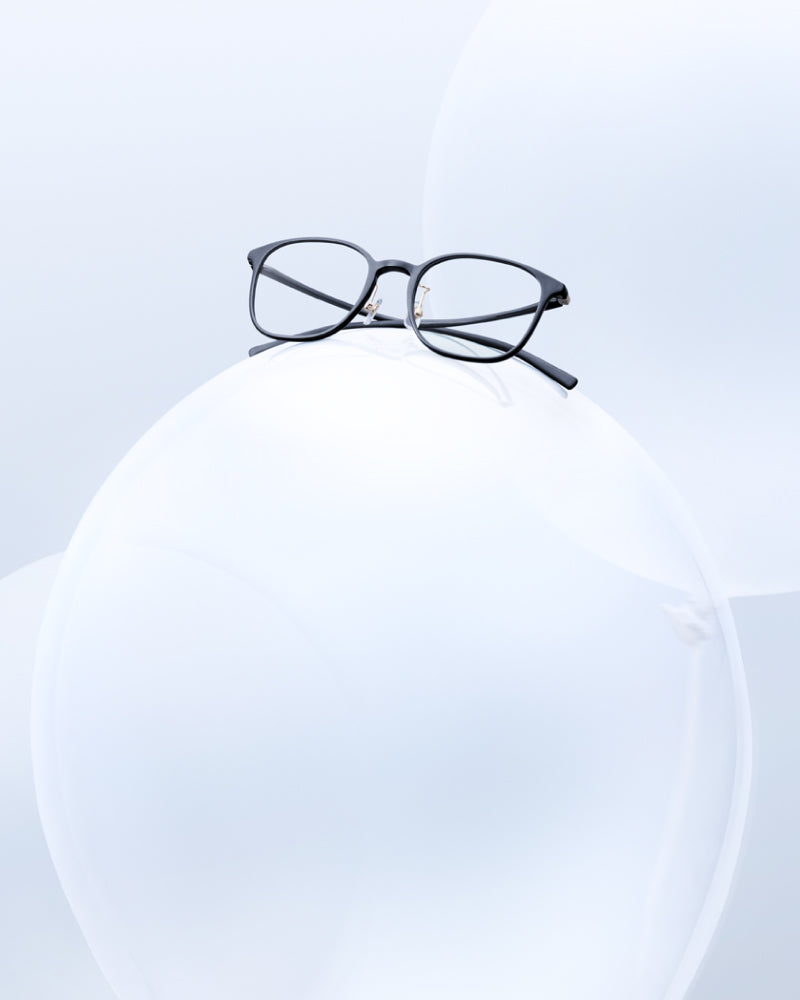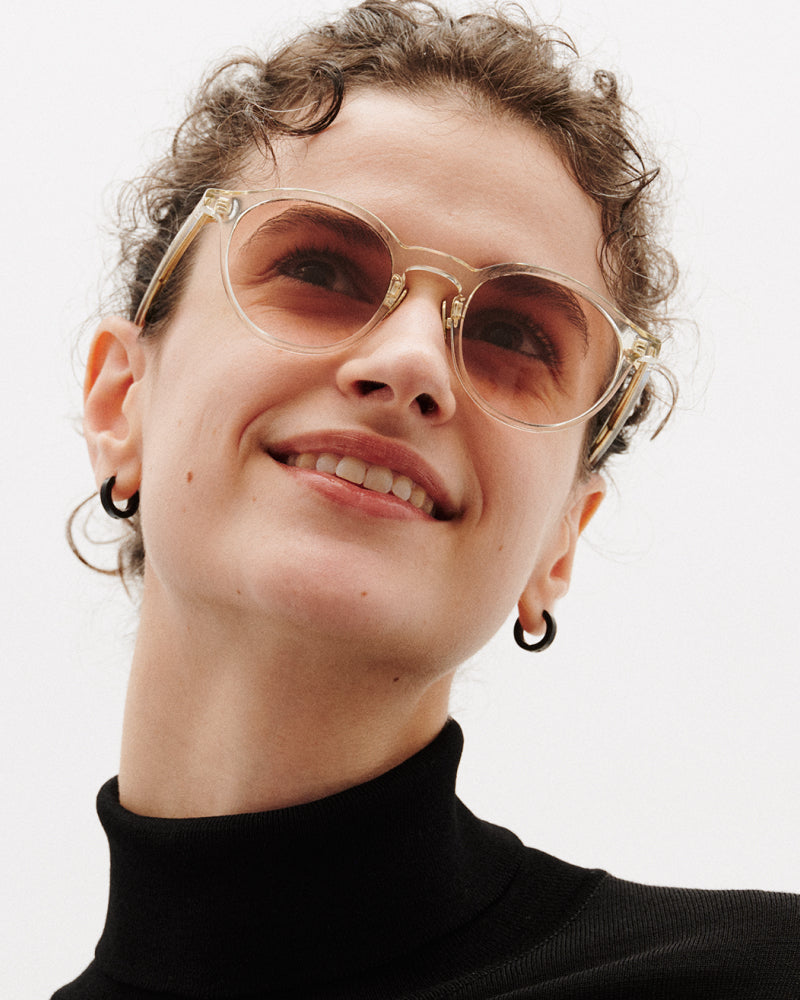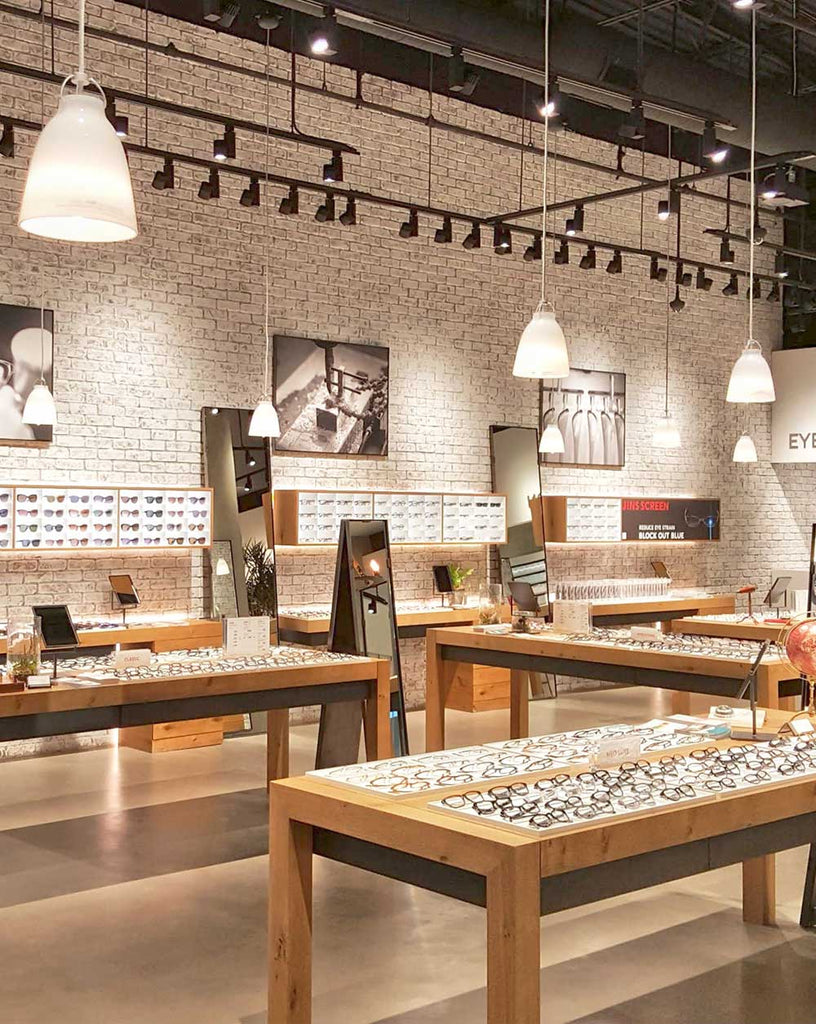

JINS SCREEN
Blue light-blocking lenses for any frame
4 BLUE LIGHT LENS TYPES
| Type | Lens Tint | Price |
|---|---|---|
|
BLUE LIGHT INVINCIBLE - MADE IN JAPAN Features an Invincible Coating to prevent scratches, dust, and reflections. |

|
+$160 |
|
ULTRA THIN SCREEN DAILY - MADE IN JAPAN The highest refractive index plastic lens with Blue Light block, double-sided aspheric design. |

|
+$410 |
|
JINS SCREEN DAILY USE Recommended for daily use. Appears light yellow tint. |
 |
+$60 |
|
JINS SCREEN HEAVY USE Recommended for heavy screen users. Appears greenish tint. |
 |
+$60 |

What's Included
-

All in One Pricing
Starting at $90
See pricing -

Free Upgrade to
Thin Lenses
See lens details*Availability Varies
-

UV Cut and Anti-Glare
Coatings Included
See lens options
JINS SCREEN Blue Light Glasses: FAQS
What is blue light?
Blue light is one of the many shades of light rays within the visible light spectrum. Blue light represents about one-third of high-energy visible (HEV) light, and it ranges from about 380 to 500 nanometers (nm) on the spectrum.
What are the common sources of blue light?
The main source of blue light is the sun, which emits natural blue light. However, there are also many man-made sources of blue light, including electronic devices.
TV screens, desktop computers, laptops, tablets, e-readers, smartphones, video games, LEDs, and fluorescent lights all emit artificial blue light. The amount is minimal in comparison to the output found in sunlight. Despite that, the exposure is still significant. That's due to the widespread use of these electronics, the excessive amount of time spent using them, and their proximity to your eyes during use.
Why is blue light bad?
Blue light isn’t inherently harmful, but lengthy, repeated exposure to blue light and blue-violet light (415 – 455 nm) can lead to many unwelcome issues. Repeated exposure to blue light may result in symptoms including headaches, mental and physical fatigue, blurred vision, digital eye strain, dry eyes, and poor sleep. Prolonged exposure to harmful HEV blue light can even increase the risk of developing age-related macular degeneration.
What does blue light do to your eyes? How is it harmful?
Blue light can harm your eyes through internal physical damage and external visual disturbances.
Externally, the short wavelengths of HEV blue light scatter easily, which causes more flickering and creates glare. Those issues reduce visual contrast, clarity, and sharpness on your screens, which makes it harder to focus and contributes to digital eye strain. Excessive eye strain can result in headaches, watery eyes, light sensitivity, double vision, fuzzy sight, and the sensation of burning or itching eyes.
Blue light can also cause internal eye problems, such as retinal damage. Harmful HEV light penetrates to the back of the eye, since the eye's cornea and lens cannot reflect or block it. Repeated exposure can lead to deterioration and macular degeneration.
How do you protect your eyes from blue light?
Reducing the use of devices and lighting that emit harmful blue light rays is the most effective approach. However, many people rely on their electronic tools for work, resulting in many hours of exposure every day. Plus, it's hard to avoid indoor LED and fluorescent lighting that contributes to blue light emissions.
Taking some preventive measures can help limit potential blue light damage. Apply the 20/20/20 rule — look away from your screen every 20 minutes at a focal point 20 feet away for 20 seconds. Scheduled breaks and regular eye exams may also have limited benefits. However, the most effective way to protect your eyes, your vision, and your health from harmful blue light is with blue light filters, like those found in our blue light glasses.
What is a blue light filter?
Blue light filters are tools that reduce or limit the amount of blue light that reaches your eyes. Though they don't block 100% of the blue light you are exposed to, a reduction in blue light exposure helps support your natural sleep cycle and protects against eye strain.
Tinted screen covers, glass overlays, and plastic sheets filter blue light for individual devices. Filtering software and display button settings can minimize some blue light emissions for various electronics. Yet, these options are limited, and none address LED and fluorescent lighting.
Blue light glasses are the most effective blue light filter option. You can use digital protection lens technology anywhere, at any time, with an unlimited number of devices.
How do blue light filtering glasses, or computer glasses, work?
These glasses have a tinted protective coating that limits the amount of blue light that reaches your eyes. They work in most settings with any blue-light emitting device. They're also called computer glasses, blue light blocking glasses, and blue light glasses.
What do blue light glasses do?
Blue light glasses help protect your eyes, visual acuity, and health by screening a percentage of the blue light you come in contact with. They let you and your family enjoy your digital devices and use artificial LED and fluorescent lighting without worry of excessive harmful blue light exposure. They're a portable and affordable option that offers versatility and flexibility, unlike blue light filters, which are tailored to specific devices.
What are the benefits of digital protection, or blue light filtering glasses?
Blue light glasses help lessen your exposure to harmful blue light. With this protection, you can perform professional, educational, and recreational activities on your electronic devices without fear of excessive damage from blue light emissions. Digital protection glasses let you engage in essential and leisure pursuits worry-free, as they shield your eyes from harmful blue light.
How does blue light affect sleep?
Natural blue light from the sun helps maintain your internal clock — the daily rhythms of sunlight and darkness signal your body when it's time to wake and when to rest.
To assist with this, your body produces the hormone melatonin naturally to support sleep. Melatonin production is typically higher at night when it's dark. Production drops off as morning approaches and the sun comes up.
Exposure to artificial blue light emitted from electronics and indoor lighting can confuse your internal clock and lower melatonin levels, both of which make you feel more awake, and this can be harmful at night when you're supposed to be winding down for sleep.
Do I need to wear blue light glasses even at night (bedtime)?
If you use digital devices at night, blue light filter glasses can block misleading signals to your body, helping you fall asleep when you're ready. JINS SCREEN Night Use can block 60% of artificial blue light that would otherwise signal your body to decrease melatonin levels. Instead, normal production of this restful, natural sleep hormone continues, supporting your internal clock for a good night's sleep.
Do I need to use prescription glasses to use digital protection lens technology?
No prescription is necessary — you can use blue light glasses whether you have prescription eyeglasses or not.
If you wear prescription eyeglasses, you can add blue light digital protection technology to your order. It can also be added to IOC lenses.
Finally, if you don't need corrective lenses, you can wear non-prescription blue light glasses as needed.
Can I use digital protection glasses along with contact lenses?
Yes. Contact lens wearers can absolutely use blue light filtering glasses.
And if you happen to use reading glasses for close-up work, you can add blue light digital protection to them.
Can digital protection lenses be ordered with progressive prescriptions?
Yes. Just add blue light filtering to your progressive lens order. When placing your order with JINS, select the dropdown menu under "Lens Option" and choose between JINS SCREEN DAILY USE, JINS SCREEN HEAVY USE, and JINS SCREEN NIGHT USE for your personalized needs.
Are lenses that are both color-tinted and photochromic available?
No, you can't combine these features when you choose JINS blue light glasses.
Photochromic lenses respond to external lighting conditions, changing shade as required, whereas tinted lenses maintain their permanent tint in all settings. Therefore, you may choose either feature with your blue light glasses but not both.
Are blue light filtering or digital protection lenses available with anti-reflective coatings?
Yes, anti-reflective coatings are one of the many options you can select for your blue light digital protection lenses. These useful glasses are also water-resistant and feature a hard coating for durability and longevity.
Can I wear blue light filtering glasses all day?
Yes, you can safely wear these blue light glasses as long as you need them. Our JINS SCREEN NIGHT USE glasses are an excellent option for nightwear before bedtime. With an amber orange tint, these glasses filter 60% of blue light. Watch TV, answer emails, and catch up on social media news before bed without fear of staying awake past bedtime.
Can my child wear blue light filtering or digital protection glasses?
Yes, children can wear blue light filtering glasses. Furthermore, because kids are some of the biggest users of digital devices, blocking harmful blue light from their developing eyes is a smart idea.
Can I order 'clear' or 'zero tint' digital protection or blue light filtering glasses?
While zero tint blue light glasses are not available from JINS, our digital protection glasses have varying tint shades and levels.
- JINS SCREEN DAILY USE: Great for everyday use, these computer glasses boast very minimal tint. These are clear lenses with a blue coating that filters 25% of blue light.
- JINS SCREEN HEAVY USE: lenses may be more suitable if you engage in heavy screen use. The light green tint of these glasses blocks 40% of blue light.
- JINS SCREEN HEAVY USE Gaming Glasses: help to ease eye fatigue thanks to their green tint, which blocks up to 40% of blue light.
- JINS SCREEN NIGHT USE: glasses filter the largest percentage of blue light — up to 60% — and feature an amber orange tint
Where can I buy blue light glasses?
Order quality blue light filter glasses from the comfort of your home from JINS. Browse our online selection and choose the blue light glasses that suit your style and blue light blocking needs.
Pick a frame and a color or pattern, select your JINS SCREEN blue light lens option, choose your lens type, and case and complete your order.
Why opt for JINS SCREEN blue light filter lenses?
JINS blue light filtering eyewear meets the demanding needs of today's digital consumer. Shop blue light glasses for everyday use, intense gaming activities, and nighttime digital habits.
We offer prescription and non-prescription blue light lenses for more adaptability. Progressive lenses and non-prescription readers are also eligible for blue light filter coating from JINS. Plus, our versatile line of available frames gives you many choices to match your personal style.









